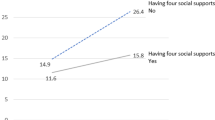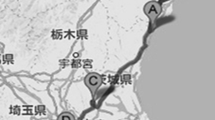Abstract
This study investigated pre- to post-disaster changes in happiness of 491 women affected by Hurricane Katrina, and identified factors that were associated with the survivors’ happiness after the storm. Participants completed surveys approximately 1 year before and 1 and 4 years after the storm. The surveys collected information on the women’s happiness, social support, household characteristics, and hurricane exposure. We found that happiness significantly decreased from pre-disaster to 1 year post-disaster but there were no significant differences in happiness between the pre-disaster and 4 years post-disaster assessments. An exception were 38 women who continued to have lower levels of happiness 4 years post-disaster than at pre-disaster. These women were more likely to be living on their own after the storm and reported consistently lower levels of perceived social support from the community both before and after the storm than the other women of the sample. Factors associated with the survivor’s happiness after the storm included exposure to hurricane stressors and losing a loved one to the hurricane. These were predictive of lower happiness 1 year post-disaster. Four years after the hurricane only exposure to hurricane stressors was predictive of lower levels of happiness. In contrast, pre-disaster happiness and post-disaster social support were protective against the negative effect of the hurricane on survivors’ happiness.
Similar content being viewed by others
References
Abramson, D., Stehling-Ariza, T., Garfield, R., & Redlener, I. (2008). Prevalence and predictors of mental health distress post-Katrina: Findings from the gulf coast child and family health study. Disaster Medicine and Public Health Preparedness, 2, 77–86.
Ardalan, A., Mazaheri, M., Vanrooyen, M., Mowafi, H., Nedjat, S., Holakouie, N., et al. (2011). Post-disaster quality of life among older survivors 5 years after the Bam earthquake: Implications for recovery policy. Ageing and Society, 31, 179–196.
Barger, S. D., Donoho, C. J., & Wayment, H. A. (2009). The relative contributions of race/ethnicity, socioeconomic status, health, and social relationships to life satisfaction in the United States. Quality of Life Research, 18, 179–189.
Blanchflower, D. G. (2008). International evidence on well-being. NBER working paper 14318. Cambridge, MA: National Bureau of Economic Research.
Bolger, N., & Schilling, E. A. (1991). Personality and the problems of everyday life: The role of neuroticism in exposure and reactivity to daily stressors. Journal of Personality, 59, 355–386.
Boyce, C. J., & Wood, A. M. (2011). Personality prior to disability determines adaptation: Agreeable individuals recover lost life satisfaction faster and more completely. Psychological Science, 22, 1397–1402.
Brock, T., & LeBlanc, A. (2005). Promoting students success in community college and beyond. The Opening Doors demonstration. New York, NY: MDRC.
Brodie, M., Weltzien, E., Altman, D., Blendon, R. J., & Benson, J. M. (2006). Experiences of Hurricane Katrina evacuees in Houston shelters: Implications for future planning. American Journal of Public Health, 96, 1402–1408.
Calvo, R., Zheng, Y., Kumar, S., Olgiati, A., & Berkman, L. F. (2012). Well-being and social capital on planet Earth: Cross-national evidence from 142 countries. PLoS ONE, 7(8), e42793. doi:10.1371/journal.pone.0042793.
Chan, C. S., Rhodes, J. E., & Perez, J. E. (2012). A prospective study of religiousness and psychological distress among female survivors of Hurricanes Katrina and Rita. American Journal of Community Psychology, 49, 168–181.
Cutrona, C. E., & Russell, D. (1987). The provisions of social relationships and adaptation to stress. In W. H. Jones & D. Perlman (Eds.), Advances in personal relationships (Vol. 1, pp. 37–67). Greenwich, CT: JAI Press.
Delle Fave, A., Brdar, I., Freire, T., Vella-Brodrick, D., & Wissing, M. P. (2011). The eudaimonic and hedonic components of happiness: Qualitative and quantitative findings. Social Indicators Research, 100, 185–207.
Dell’Osso, L., Carmassi, C., Massimetti, G., Daneluzzo, E., Di Tommaso, S., & Rossi, A. (2011). Full and partial PTSD among young adult survivors 10 months after the L’Aquila 2009 earthquake: Gender differences. Journal of Affective Disorders, 131, 79–83.
Diener, E. (1984). Subjective well-being. Psychological Bulletin, 95, 542–575.
Diener, E., & Biswas-Diener, R. (2002). Will money increase subjective well-being? A review and guide to needed literature. Social Indicators Research, 57, 119–169.
Diener, E., Inglehart, R., & Tay, L. (2013). Theory and validity of life satisfaction scales. Social Indicators Research, 112, 497–527.
Diener, E., Suh, E. M., Lucas, R. E., & Smith, H. L. (1999). Subjective well-being: Three decades of progress. Psychological Bulletin, 125, 276–302.
Elliott, J. R., & Pais, J. (2006). Race, class, and Hurricane Katrina: Social differences in human responses to disasters. Social Science Research, 35, 295–321.
Helliwell, J. F., & Putnam, R. D. (2004). The social context of well-being. Philosophical Transactions of the Royal Society of London Series B-Biological Sciences, 359, 1435–1446.
Hunter, L. M., & David, E. (2011). Climate change and migration: Considering gender dimensions. In E. Piguet, P. de Guchteneire, & A. Pecoud (Eds.), Climate change and migration (pp. 306–330). New York, NY: UNESCO Publishing and Cambridge University.
Kalton, G. (1986). Handling wave nonresponse in panel surveys. Journal of Official Statistics, 2, 303–314.
Kimball, K., Levy, H., Ohtake, F., & Tsutsui, Y. (2006). Unhappiness after hurricane Katrina, NBER Working Papers, 12062, National Bureau of Economic Research, Inc.
Kim-Prieto, C., & Diener, E. (2009). Religion as a source of variation in the experience of positive and negative emotions. The Journal of Positive Psychology, 4, 447–760.
Laditka, S. B., Murray, L. M., & Laditka, J. N. (2010). In the eye of the storm: Resilience and vulnerability among African American women in the wake of Hurricane Katrina. Health Care for Women International, 31, 1013–1027.
LaJoie, A. S., Sprang, G., & McKinney, P. (2010). Long-term effects of Hurricane Katrina on the psychological well-being of evacuees. Disasters, 34, 1031–1044.
Larsen, R. J., & Ketelaar, T. (1991). Personality and susceptibility to positive and negative emotional states. Journal of Personality and Social Psychology, 61, 132–140.
Lin, M. R., Huang, W., Huang, C., Hwang, H., Tsai, L., & Chui, Y. (2002). The impact of the Chi-Chi earthquake on quality of life among elderly survivors in Taiwan: A before and after study. Quality of Life Research, 11, 379–388.
Lowe, S. R., Chan, C. S., & Rhodes, J. E. (2010). Pre-hurricane perceived social support protects against psychological distress: A longitudinal analysis of low-income mothers. Journal of Consulting and Clinical Psychology, 78(4), 551–560.
Lucas, R. E., Diener, E., & Suh, E. M. (1996). Discriminant validity of well-being measures. Journal of Personality and Social Psychology, 71, 616–618.
Luechinger, S., & Raschky, P. A. (2009). Valuing flood disasters using the life satisfaction approach. Journal of Public Economics, 93, 620–633.
McMahan, E., & Estes, D. (2011). Hedonic versus eudaimonic conceptions of well-being: Evidence of differential associations with self-reported well-being. Social Indicators Research, 103, 93–108.
Mills, M. A., Edmondson, D., & Park, C. L. (2007). Trauma and stress response among Hurricane Katrina evacuees. American Journal of Public Health, 97(Supp. 1), S116–S123.
Nolan-Hoeksema, S., & Rusting, C. L. (2003). Gender differences in well-being. In D. Kahneman, E. Diener, & N. Schwarz (Eds.), Well-being: The foundations of hedonic psychology (pp. 330–348). New York, NY: Russell Sage.
Norris, F., Friedman, M., Watson, P., Byrne, C., Diaz, E., & Kaniasty, K. (2002). 60,000 disaster victims speak. Part I: An empirical review of the empirical literature, 1981–2001. Psychiatry, 65, 207–239.
North, C. S., Oliver, J., & Pandya, A. (2012). Examining a comprehensive model of disaster-related posttraumatic stress disorder in systematically studied survivors of 10 disasters. American Journal of Public Health, 102, 40–48.
Pai, M., & Carr, D. (2010). Do personality traits moderate the effect of late-life spousal loss on psychological distress? Journal of Health and Social Behavior, 51, 183–199.
Papanikolau, V., Adamis, D., & Kyriopoulos, J. (2012). Long-term quality of life after a wildfire disaster in a rural part of Greece. Open Journal of Psychiatry, 2, 164–170.
Pavot, W., & Diener, E. (2009). Review of the satisfaction with life scale. Assessing well-being. Social Indicators Research Series, 39, 101–117.
Paxson, C., Fussell, E., Rhodes, J., & Waters, M. (2012). Five years later: Recovery from post traumatic stress and psychological distress among low-income mothers affected by Hurricane Katrina. Social Science and Medicine, 74, 150–157.
Priebe, S., Grappasonni, I., Mari, M., Dewey, M., Petrelli, F., & Costa, A. (2009). Post-traumatic stress disorder 6 months after an earthquake: Findings from a community sample in a rural region in Italy. Social Psychiatry and Psychiatry Epidemiology, 44, 393–397.
Priebe, S., Marchi, F., Bini, L., Flego, M., Costa, A., & Galeazzi, G. (2011). Mental disorders, psychological symptoms and quality of life 8 years after an earthquake: Finding form a community sample in Italy. Social Psychiatry and Psychiatric Epidemiology, 46, 615–621.
Raibley, J. R. (2012). Happiness is not well-being. Journal of Happiness Studies, 13, 1105–1129.
Rateau, M. R. (2009). Differences in emotional well-being of hurricane survivors: A secondary analysis of the ABC news Hurricane Katrina anniversary poll. Archives of Psychiatric Nursing, 23, 269–271.
Reid, M., & Reczek, C. (2011). Stress and support in family relationships after Hurricane Katrina. Journal of Family Issues, 32, 1397–1418.
Rhodes, J., Chan, C., Paxson, C., Rouse, C. E., Waters, M., & Fussel, E. (2010). The impact of Hurricane Katrina on the mental and physical health of low-income parents in New Orleans. American Journal of Orthopsychiatry, 80, 237–247.
Rivera, J. D., & Miller, D. S. (2007). Continually neglected: Situating natural disasters in the African American experience. Journal of Black Studies, 37, 502–522.
Ryan, R. M., & Deci, E. L. (2001). On happiness and human potentials: A review of research on hedonic and eudaimonic well-being. Annual Review of Psychology, 52, 141–166.
Siedlecki, K. L., Tucker-Drob, E. M., Oishi, S., & Salthouse, T. A. (2008). Life satisfaction across adulthood: Different determinants at different ages? The Journal of Positive Psychology, 3, 153–164.
Steel, P., Schmidt, J., & Shultz, J. (2008). Refining the relationship between personality and subjective well-being. Psychological Bulletin, 134, 138–161.
Townsend, F. F. (2006). The federal response to Hurricane Katrina. Lessons learned. Washington, DC: The White House.
Uchida, Y., Takahashi, Y., & Kawahara, K. (2013). Changes in hedonic and eudaimonic well-being after a severe nationwide disaster: The case of the great east Japan earthquake. Journal of Happiness Studies. doi:10.1007/s10902-013-9463-6.
Vanassche, S., Swicegood, G., & Matthijs, K. (2013). Marriage and children as a key to happiness? Cross-national differences in the effects of marital status and children on well-being. Journal of Happiness Studies, 14, 501–524.
Wang, X., Gao, L., Zhang, H., Zhao, C., Shen, Y., & Shinfuku, N. (2000). Post-earthquake quality of life and psychological well-being: Longitudinal evaluation in a rural community sample in northern China. Psychiatric and Clinical Neurosciences, 54, 427–433.
Wu, H. C., Chou, P., Chou, F. H., Su, C. Y., Tsai, K. Y., Ou-Yang, W. C., et al. (2006). Survey of quality of life and risk factors for a Taiwanese village population 3 years post-earthquake. Australia and New Zealand Journal of Psychiatry, 40(4), 355–361.
Zhao, C., Wu, Z., & Xu, J. (2013). The association between post-traumatic stress disorder symptoms and the quality of life among Wenchuan earthquake survivors: The role of social support as a moderator. Quality of Life Research, 22, 733–743.
Acknowledgments
This study was funded by National Institutes of Health Grant R01HD046162 and RO1HD057599, the National Science Foundation, the MacArthur Foundation, and the Princeton Center for Economic Policy Studies. We are grateful to the editor and two anonymous reviewers for their insightful comments and suggestions.
Author information
Authors and Affiliations
Corresponding author
Rights and permissions
About this article
Cite this article
Calvo, R., Arcaya, M., Baum, C.F. et al. Happily Ever After? Pre-and-Post Disaster Determinants of Happiness Among Survivors of Hurricane Katrina. J Happiness Stud 16, 427–442 (2015). https://doi.org/10.1007/s10902-014-9516-5
Published:
Issue Date:
DOI: https://doi.org/10.1007/s10902-014-9516-5




